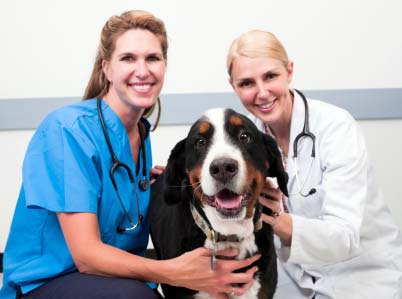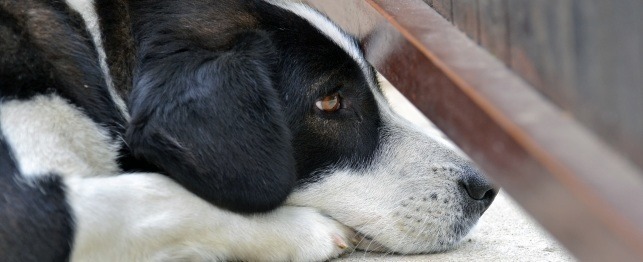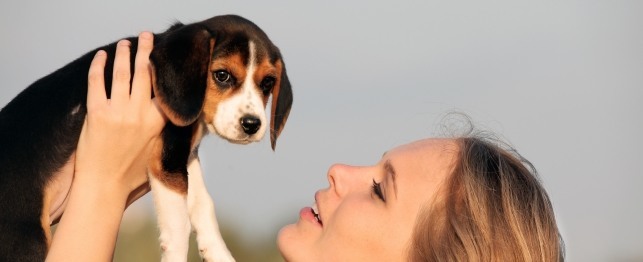There are hundreds of breeds to choose from when looking for a hunting dog. Just like they all exhibit different characteristics for hunting different types of game, each breed is also predisposed to different types of health risks and concerns.
As with any dog, exercise and diet is an essential preventative, but each breed will require different levels of both. Overall, when shopping for a dog, it should have straight front legs, with the rear wide and straight, and a slight variation in angles in the back legs, depending on the type of hunting you'll do. When looking for your perfect hunting companion be sure to do some research about a few different breeds and familiarize yourself with their special needs.
Labrador Retrievers : This breed is an extremely popular choice for many different types of hunting. They are in the Sporting Group and hold the #1 ranking in the AKC. Originally from Newfoundland, in the 1800's they were know as the St. John's Newfoundland and used primarily as water dogs. The retriever has a moderate energy level, but is very playful, affectionate, and friendly towards other animals and humans. If necessary they can be a good watch dog, but overall they are friendly to even strangers.
Major health concerns with this breed are canine hip dysplasia (CHD), gastric torsion, retinal dysplasia/skeletal dwarfism, muscular dystrophy, and elbow dysplasia. Minor concerns with the breed are cataracts, osteochondritis dissecans (OCD), central progressive retinal atrophy (CPRA), and pyotraumatic dermatitis. Diabetes, entropion, and distichiasis are also occasionally seen in this breed. The Labrador retriever has a lifespan of 10-12 years on average.
German Short-Haired Pointer : This breed, also known as the German short-haired pointing dog, or the Deutsch kurzhaar, is another extremely popular breed chosen by hunters. It is ranked #24 by the AKC and also requires a moderate amount of exercise. The average lifespan is 12-14 years, and often becomes frustrated if not given the physical and mental exercise it needs. The biggest health concern for this breed is lymphedema, but CHD, entropion, gastric torsion, vWD, pannus, and OCD are also seen. Testing should be done on both the puppy and it's parents for hip, eye, and blood problems.
Brittany : The brittany is a cross between small land spaniels and the English setter back in the 1800's. This dog is rated #33 by the AKC and is the leggiest of all the hunting dogs. They require a high amount of exercise as their energy level is high, and they are very easy to train, extremely friendly, and make a good watchdog. Health issues common to this breed are CHD, with minor concerns of epilepsy and lipfold pyoderma.
English Pointers : Also known as just a pointer, this breed dates back to the 17th century where it was used to point hare. This breed ranks #92 by the AKC and has a high energy level, and needs lots of exercise. It's also very playful and affectionate, is friendly towards other animals, and has a high watchdog ability. Major health risks for this dog are entropion, and CHD is a minor concern. Testing in the hip and eye can be done to determine the animal's predisposal to future issues, and this dog is prone to tail-tip injuries.

 Tips for Finding Your Missing Dog
Tips for Finding Your Missing Dog
Tips for Finding Your Missing Dog
Tips for Finding Your Missing Dog
 Cancer in Dogs
Dr. Patrick Mahaney is a veterinari
Cancer in Dogs
Dr. Patrick Mahaney is a veterinari
 Nature’s Help for Dogs Afflicted with Heart Disease
Various natural supplements might h
Nature’s Help for Dogs Afflicted with Heart Disease
Various natural supplements might h
 How to Protect Against Dog Theft
How to Protect Against Dog Theft
How to Protect Against Dog Theft
How to Protect Against Dog Theft
 A Veterinarians Advice for New Puppy Parents
A Veterinarians Advice for New Puppy Parents
A Veterinarians Advice for New Puppy Parents
A Veterinarians Advice for New Puppy Parents